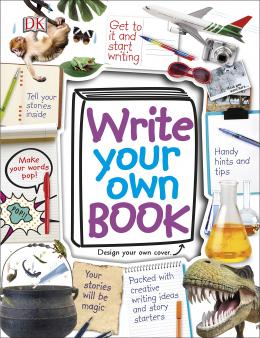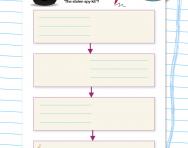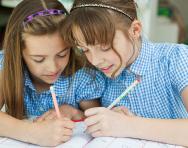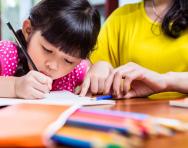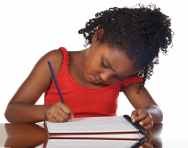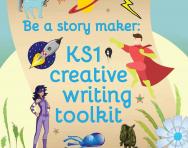Teachers' tips for creative writing

Right from the Foundation Stage, ‘composition’ – in other words, creative writing – is an important part of the English curriculum. It’s a chance for your child to let their imagination run wild, but putting together a good story, poem or other piece of creative writing involves more than just scribbling their thoughts down on a piece of paper and then handing it in.
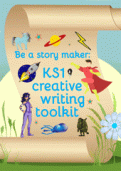
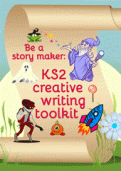
Download a FREE Creative Writing toolkit!
- KS1 & KS2 workbooks
- Bursting with fill-in prompt sheets and inspiring ideas
- Story structure tips, style guides and editing suggestions
We asked teacher Jacqueline Harris, author of Write your own Book (£9.99, Dorling Kindersley), for her tried and tested tips for writing a brilliant story.
Before your child starts writing
Being a really good writer doesn’t start with writing: there are two essential things your child needs to do before they even put pen to paper.
One is to read a lot. ‘The more you read, the more good models of writing you’ll have in your head, which you can use yourself,’ says Jacqueline. ‘Reading gives you ideas and shows you how a story works.’
If your child isn’t a fan of fiction, it doesn’t matter. ‘Non-fiction, newspapers and magazines will all give you good ideas for things to write about, as well as showing you how to construct a good sentence,’ Jacqueline explains. ‘Reading also helps with spelling and increases your vocabulary, which is very helpful when writing.’
The other important thing for your child to do is talk. ‘Talking helps to sort out your ideas and often gives you new ones,’ says Jacqueline. ‘If you’re writing an important letter, for example, it really helps to talk about it first as it gives you a chance to think about the points you want to make. It’s the same with writing a story. Talking about it means you can try out ideas with someone else, and they can ask questions that might lead to even more exciting ideas. If you have a pad and pen handy you can make notes every time a great idea pops into your head.’
Where to find inspiration
As many adult authors will tell you, inspiration comes from all sorts of places. ‘Sometimes it comes from their own experience, and they just add a little twist to make it really interesting,’ Jacqueline explains. ‘Start with things you know already and then add something to make it different and exciting.’
Imagine, for instance, that your child’s homework is to write a story about their school. ‘Think about what it’s like, and what the building is like,’ suggests Jacqueline. ‘Then imagine it in the dark, with no lights and no one else there. What would it be like, and why might you be there by yourself?’
You can use this technique to find ideas for almost any subject or situation. ‘You could imagine you’re playing for your football team and someone spots your talent, or you’re singing with your friends on the bus and someone wants to sign you up there and then. What happens next?’ says Jacqueline.
Planning your story
When they’ve got a great idea (or are just keen to get their homework finished as quickly as possible!), children often think that planning their story is unnecessary, and they just want to get started. But planning is never a waste of time, says Jacqueline.
‘It’s a good way of thinking through the ideas and deciding which are the best bits, and also ensures you’ve thought about what’s actually going to happen in your story,’ she says. ‘A plan can just be a few notes to get you started, but the most helpful plans have a beginning, middle and end roughly plotted out. That way you don’t fall into the trap of writing away but nothing much actually happening in your story.’
If your child still doesn’t think planning is necessary, consider this: ‘JK Rowling had already decided the main plot of all the Harry Potter books before she wrote the first one,’ Jacqueline adds. ‘She didn’t have the detail, but she knew the main events so everything she wrote lead up to the finale.’
Getting your ideas on paper
Children are conditioned to think that they need to do their best work all the time, but this doesn’t apply to creative writing – or at least not to the first draft. ‘When you start writing a story, the best thing to do is just write,’ Jacqueline says. ‘If you spend the entire time worrying about your spelling and punctuation, you’ll lose the excitement of writing, and your characters will quite literally wander off the page.’
While writing, your child can keep asking themselves questions to make sure their story is as good as it can be: Would you want to read this? Would you want to be friends with the main character? Would you want to be part of this adventure? ‘Write the sort of thing you would enjoy reading, and you’re halfway there,’ Jacqueline explains. ‘If you get stuck, talk to someone and pick their brains for ideas.’
Making it even better
‘The great thing about writing is that it’s not set in stone,’ says Jacqueline. ‘You can write and then go back and change things and improve them. It’s not just about correcting spelling and punctuation; it’s about making sure whoever is about to read your story is so excited by what’s happening they cannot put it down.’
One way for your child to improve their writing is to use some of the literary devices they’ve been taught in school, such as similes and metaphors. ‘Once you have all your ideas down and you’re happy with the way the story is flowing, you can use the skills you’ve been taught to improve it,’ Jacqueline explains.
For example, if your child has used the word ‘said’ repeatedly, they can go back over their writing and make sure they use a variety of different words instead. ‘Or if you have very short sentences, look at how you can vary them by using connectives and more complex sentences,’ says Jacqueline. ‘This is why you’re being taught all these skills, so use them to make the reader want to carry on reading.’
Write your own Book (£9.99, Dorling Kindersley) guides your child through the excitement of writing their very own story, helping them to master writing skills required by the national curriculum, including recounting events and persuasive writing.

Give your child a headstart
- FREE articles & expert information
- FREE resources & activities
- FREE homework help
